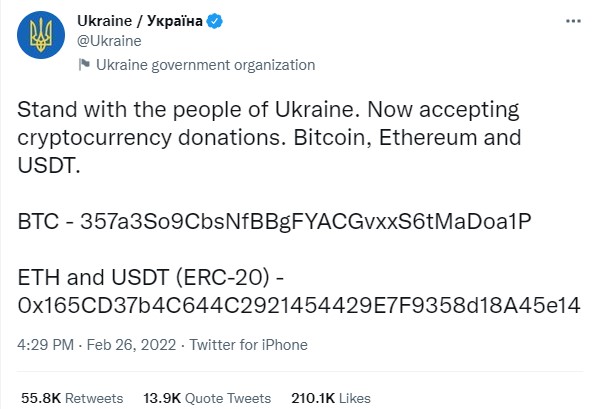Since the war in Ukraine is a tragic event that has adversely affected millions (if not billions) of people, it’s not exactly easy to talk about silver linings in this case. Nevertheless, if you’re a crypto enthusiast, you don’t really need to be that much of an attentive observer to notice that current geopolitical tensions actually exposed the true potential of crypto. Numerous Ukrainians, as well as Russians turned to blockchain technology to deal with various problems that came either as a result of the war, or sanctions that followed as a result. On top of it, many foreigners used crypto to raise funds to support their cause with regard to the war.
There is mounting evidence crypto has proven to be extremely helpful to countless people affected by the war, seeking refuge in its underlying blockchain technology. The goal of this article is to show how the war demonstrated the value and potential of crypto. If you’re ready to explore this potential, let’s jump right into it!
Crypto transcends borders
In the wake of Russia’s invasion, countless Ukrainians decided to flee their homeland. Escaping their country came with all sorts of challenges, but the most obvious was clearly the very limited amount of things that people could take with them. Not only did they have to leave their house behind, but basically every non-essential thing. The amount of essentials is usually so tiny that most emigrants leave with nearly zero possessions.
When being forced to flee you have to figure out how to take as much wealth as possible with you, but how do you cross borders with stacks of cash or gold ingots without getting robbed or having your possessions confiscated? Basically, you can’t. But luckily crypto offers a solution. Nowadays you can take your crypto with you anywhere you go by simply taking your smartphone with you. Consequently, crossing the border with your mobile phone that has a crypto wallet on it, empowers you with the ability to essentially transfer limitless amounts of money across the border without anyone knowing and without any evidence. And, if your smartphone could get stolen too, you can simply memorize a 12-word seed phrase and that’s it, you’ve got access to all your crypto without any physical items necessary!
Since numerous Ukrainians were very fond of crypto technology years before the invasion, they already had a huge chunk of their wealth positioned in digital assets. At the minimum a lot of people of Ukraine already had at least their digital wallet or account at a crypto broker, where they could store their assets. This has allowed them to take a bigger share of their wealth with them (and in a much more convenient manner) when fleeing Ukraine, in comparison to not having been so keen on crypto.
Crypto is censorship-resistant
Shortly after the invasion, Russia got removed from the cross-border payment system SWIFT, which forced the Russian population to look for alternatives when it comes to cross-border transactions. It didn’t take a lot of time until they found out that crypto can completely substitute the banking system (and also offer an additional advantage). From January to March stablecoin usage has spiked by around 60%. While this may make those that want to see the Russian economy crash angry, it is necessary to point out that the crypto community has always cherished freedom from the government (especially for people who are vehemently opposed to the government and its war - they are impacted by banking sanctions too). Witnessing a proof that crypto can bypass government sanctions therefore shows blockchain technology is able to serve its purpose successfully.

Photo #1: Crypto prevents governments from controlling your money (Source: Freepik)
Crypto is for everyone. For those you agree with, as well as for those you don’t. It doesn’t exclude anybody. While western governments were able to freeze $300 billion of Russian foreign currency reserves and confiscate millions more (along with yachts) from Russian oligarchs, they simply could not get their hands on any crypto russian residents were holding in their digital asset portfolios. The fact that Russians can use it to bypass European sanctions should be encouraging no matter what you think about the conflict, because the same applies to Russian dissidents who can bypass their own country’s restrictions. Governments should be prevented from having control over your money (Bitcoin’s original idea was actually to create money that will be independent from the government). Why? Because tomorrow they may decide to take your money, if you won’t comply with their demands. We can probably all agree that allowing the government to exercise such power can be extremely dangerous and therefore isn’t something we should strive for.
Crypto philanthropy
Just days after Russia’s ‘special military operation’ began, Ukraine announced it was starting to accept Bitcoin and Ethereum donations. Later on, Ukraine also opened the Polkadot wallet, as its founder Gavin Wood promised to donate $5 million if a DOT address gets available. Having gotten the option to donate DOT tokens, Wood eventually transferred almost 300,000 DOT to the Ukrainian wallet, which was at a time worth around $5.7 million. In less than two weeks, the total amount of donations via blockchain already exceeded $63 million dollars.

Photo #2: Ukraine's official Twitter account tweet (Source: Twitter)
Crypto has proven to be the fastest and most convenient means of engaging in philanthropy. Consequently other charity organisations followed suit and opened their crypto wallets as well. For example the Red Cross also started accepting cryptocurrency donations following the invasion, which quickly resulted in a one million donation by Crypto.com. It doesn't take a rocket scientist to figure out crypto enabled a transfer of tens (if not hundreds) of millions of dollars worth of aid to Ukraine. People from all around the globe, including countries where banks can’t operate normally, were able to provide humanitarian relief to people affected.
Conclusion
With Bitcoin down over 70% from its all-time high in November and a majority of altcoins suffering even greater losses, crypto has been in a bear market basically throughout the whole year in spite of evident use-cases it brings to the table. Nonetheless, you shouldn’t get too obsessed with the fiat market price of cryptocurrencies in the portfolio, as it can prevent you from seeing the bigger picture.
Looking solely at the price may give an impression that crypto is dead, but scratching underneath the surface reveals Bitcoin, Ethereum and many other crypto solutions continue working just as advertised, providing value to their users. It is just a matter of time until more and more people get aware of these utilities and it gets reflected in the price as well. While waiting for this moment can be frustrating, don’t forget that you’re in it for the long run and these short-term fluctuations shouldn’t bother you too much.




